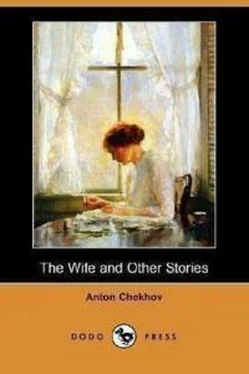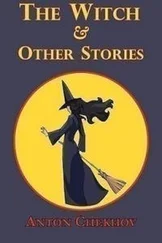"Perhaps so. I don't know," I said.
"Please go away. You want to go on at me till the morning, but I warn you I am quite worn out and cannot answer you. You promised me to go to town. I am very grateful; I ask nothing more."
My wife wanted me to go away, but it was not easy for me to do that. I was dispirited and I dreaded the big, cheerless, chill rooms that I was so weary of. Sometimes when I had an ache or a pain as a child, I used to huddle up to my mother or my nurse, and when I hid my face in the warm folds of their dress, it seemed to me as though I were hiding from the pain. And in the same way it seemed to me now that I could only hide from my uneasiness in this little room beside my wife. I sat down and screened away the light from my eyes with my hand…. There was a stillness.
"How are you to blame?" my wife said after a long silence, looking at me with red eyes that gleamed with tears. "You are very well educated and very well bred, very honest, just, and high–principled, but in you the effect of all that is that wherever you go you bring suffocation, oppression, something insulting and humiliating to the utmost degree. You have a straightforward way of looking at things, and so you hate the whole world. You hate those who have faith, because faith is an expression of ignorance and lack of culture, and at the same time you hate those who have no faith for having no faith and no ideals; you hate old people for being conservative and behind the times, and young people for free–thinking. The interests of the peasantry and of Russia are dear to you, and so you hate the peasants because you suspect every one of them of being a thief and a robber. You hate every one. You are just, and always take your stand on your legal rights, and so you are always at law with the peasants and your neighbours. You have had twenty bushels of rye stolen, and your love of order has made you complain of the peasants to the Governor and all the local authorities, and to send a complaint of the local authorities to Petersburg. Legal justice!" said my wife, and she laughed. "On the ground of your legal rights and in the interests of morality, you refuse to give me a passport. Law and morality is such that a self–respecting healthy young woman has to spend her life in idleness, in depression, and in continual apprehension, and to receive in return board and lodging from a man she does not love. You have a thorough knowledge of the law, you are very honest and just, you respect marriage and family life, and the effect of all that is that all your life you have not done one kind action, that every one hates you, that you are on bad terms with every one, and the seven years that you have been married you've only lived seven months with your wife. You've had no wife and I've had no husband. To live with a man like you is impossible; there is no way of doing it. In the early years I was frightened with you, and now I am ashamed…. That's how my best years have been wasted. When I fought with you I ruined my temper, grew shrewish, coarse, timid, mistrustful…. Oh, but what's the use of talking! As though you wanted to understand! Go upstairs, and God be with you!"
My wife lay down on the couch and sank into thought.
"And how splendid, how enviable life might have been!" she said softly, looking reflectively into the fire. "What a life it might have been! There's no bringing it back now."
Any one who has lived in the country in winter and knows those long dreary, still evenings when even the dogs are too bored to bark and even the clocks seem weary of ticking, and any one who on such evenings has been troubled by awakening conscience and has moved restlessly about, trying now to smother his conscience, now to interpret it, will understand the distraction and the pleasure my wife's voice gave me as it sounded in the snug little room, telling me I was a bad man. I did not understand what was wanted of me by my conscience, and my wife, translating it in her feminine way, made clear to me in the meaning of my agitation. As often before in the moments of intense uneasiness, I guessed that the whole secret lay, not in the starving peasants, but in my not being the sort of a man I ought to be.
My wife got up with an effort and came up to me.
"Pavel Andreitch," she said, smiling mournfully, "forgive me, I don't believe you: you are not going away, but I will ask you one more favour. Call this"—she pointed to her papers—"self–deception, feminine logic, a mistake, as you like; but do not hinder me. It's all that is left me in life." She turned away and paused. "Before this I had nothing. I have wasted my youth in fighting with you. Now I have caught at this and am living; I am happy…. It seems to me that I have found in this a means of justifying my existence."
"Natalie, you are a good woman, a woman of ideas," I said, looking at my wife enthusiastically, "and everything you say and do is intelligent and fine."
I walked about the room to conceal my emotion.
"Natalie," I went on a minute later, "before I go away, I beg of you as a special favour, help me to do something for the starving peasants!"
"What can I do?" said my wife, shrugging her shoulders. "Here's the subscription list."
She rummaged among the papers and found the subscription list.
"Subscribe some money," she said, and from her tone I could see that she did not attach great importance to her subscription list; "that is the only way in which you can take part in the work."
I took the list and wrote: "Anonymous, 5,000."
In this "anonymous" there was something wrong, false, conceited, but I only realized that when I noticed that my wife flushed very red and hurriedly thrust the list into the heap of papers. We both felt ashamed; I felt that I must at all costs efface this clumsiness at once, or else I should feel ashamed afterwards, in the train and at Petersburg. But how efface it? What was I to say?
"I fully approve of what you are doing, Natalie," I said genuinely, "and I wish you every success. But allow me at parting to give you one piece of advice, Natalie; be on your guard with Sobol, and with your assistants generally, and don't trust them blindly. I don't say they are not honest, but they are not gentlefolks; they are people with no ideas, no ideals, no faith, with no aim in life, no definite principles, and the whole object of their life is comprised in the rouble. Rouble, rouble, rouble!" I sighed. "They are fond of getting money easily, for nothing, and in that respect the better educated they are the more they are to be dreaded."
My wife went to the couch and lay down.
"Ideas," she brought out, listlessly and reluctantly, "ideas, ideals, objects of life, principles….you always used to use those words when you wanted to insult or humiliate some one, or say something unpleasant. Yes, that's your way: if with your views and such an attitude to people you are allowed to take part in anything, you would destroy it from the first day. It's time you understand that."
She sighed and paused.
"It's coarseness of character, Pavel Andreitch," she said. "You are well–bred and educated, but what a…Scythian you are in reality! That's because you lead a cramped life full of hatred, see no one, and read nothing but your engineering books. And, you know, there are good people, good books! Yes…but I am exhausted and it wearies me to talk. I ought to be in bed."
"So I am going away, Natalie," I said.
"Yes…yes…. Merci …."
I stood still for a little while, then went upstairs. An hour later—it was half–past one—I went downstairs again with a candle in my hand to speak to my wife. I didn't know what I was going to say to her, but I felt that I must say some thing very important and necessary. She was not in her study, the door leading to her bedroom was closed.
Читать дальше












